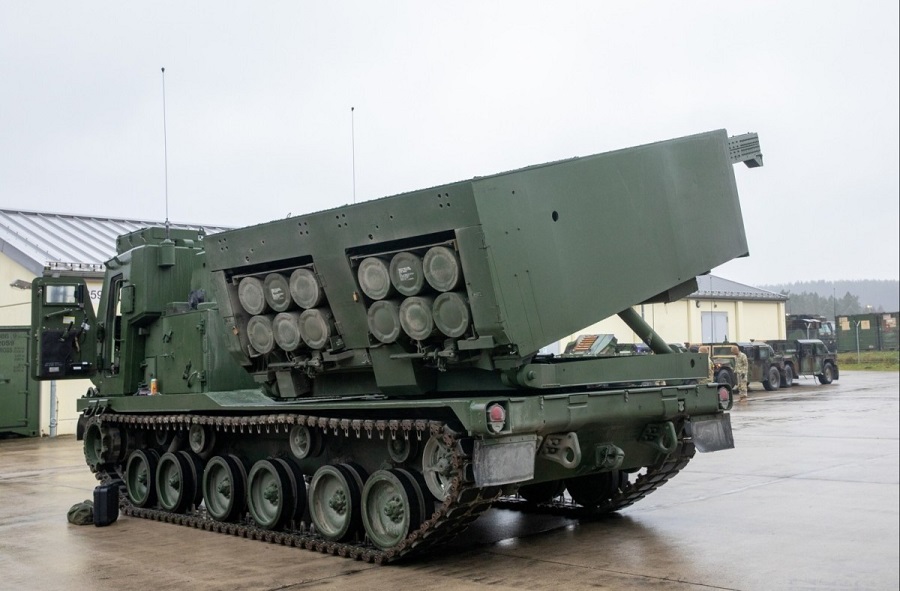 The U.S. Army’s 41st Field Artillery Brigade has become the first
unit to be fully equipped
with the M270A2 Multiple Launch Rocket Systems (MLRS), officials
announced on 16 December 2024. The milestone marks a significant step
in enhancing V Corps' indirect fire capabilities at Grafenwoehr,
Germany.
The U.S. Army’s 41st Field Artillery Brigade has become the first
unit to be fully equipped
with the M270A2 Multiple Launch Rocket Systems (MLRS), officials
announced on 16 December 2024. The milestone marks a significant step
in enhancing V Corps' indirect fire capabilities at Grafenwoehr,
Germany.
The 41st Field Artillery Brigade, one of V Corps’ three permanently forward-deployed brigades, has replaced its older M270A1 systems with the advanced A2 model. This modernisation improves regional readiness and reinforces the brigade’s role in European defence operations.
Capt. Kendal Peter, commander of Charlie Battery, 1st Battalion, 77th Field Artillery Regiment, noted the advantages of the new system. “The major difference we have seen with the M270A2 is that they are a little bit faster and more mobile,” Peter said. “They have an improved cab that protects the soldiers which the M270A1 did not have, as well as a myriad of system upgrades that allow us to shoot faster and process missions more efficiently.”
The M270A2 includes a range of upgrades such as a 600-horsepower engine, advanced fire control systems, and an improved armoured cab for enhanced crew survivability. The system is also designed to accommodate the U.S. Army’s next-generation munitions, providing greater firepower and flexibility on the battlefield.
The brigade debuted the upgraded MLRS during Exercise Dynamic Front 25 in November 2024, a multinational exercise aimed at enhancing artillery fire capabilities among NATO allies. The training showcased the M270A2’s interoperability alongside NATO partner forces’ artillery systems.
Lockheed-Martin initially delivered the M270A2 to the U.S. Army in 2022, and the system is also set to be adopted by other NATO members, including Germany and the United Kingdom. The 41st Brigade began receiving the modernised launchers in October 2024, allowing crews time to train ahead of their operational deployment.
Staff Sgt. Zariah Fernandez, a platoon sergeant for Charlie Battery, highlighted the importance of joint training exercises. “Being in Europe we have had the opportunity to do a lot of NATO and joint exercises,” Fernandez said. “I am really looking forward to us being able to get in with our allies and execute long-range munition fires and seeing what we can do with them.”
The modernisation of the MLRS strengthens NATO’s collective deterrence strategy and enhances readiness across the European theatre. By improving interoperability, the U.S. Army reinforces its commitment to regional security and partnership with allied forces.
Capt. Peter underscored the 41st Field Artillery Brigade’s readiness to respond to any contingency. “Being the only field artillery brigade that supports the European theater, we are the number one call when it comes to a conflict,” Peter said. “I have full confidence that our batteries can rise to the challenge and support any mission or conflict we get called to.”
The 41st Field Artillery Brigade, one of V Corps’ three permanently forward-deployed brigades, has replaced its older M270A1 systems with the advanced A2 model. This modernisation improves regional readiness and reinforces the brigade’s role in European defence operations.
Capt.Kendal Peter, commander of Charlie Battery, 1st Battalion, 77th Field Artillery Regiment, noted the advantages of the new system. “The major difference we have seen with the M270A2 is that they are a little bit faster and more mobile,” Peter said. “They have an improved cab that protects the soldiers which the M270A1 did not have, as well as a myriad of system upgrades that allow us to shoot faster and process missions more efficiently.”
The M270A2 includes a range of upgrades such as a 600-horsepower engine, advanced fire control systems, and an improved armoured cab for enhanced crew survivability. The system is also designed to accommodate the U.S. Army’s next-generation munitions, providing greater firepower and flexibility on the battlefield.
The 41st Artillery Brigade debuted the upgraded MLRS during Exercise Dynamic Front 25 in November 2024, a multinational exercise aimed at enhancing artillery fire capabilities among NATO allies. The training showcased the M270A2’s interoperability alongside NATO partner forces’ artillery systems.
Lockheed-Martin initially delivered the M270A2 to the U.S. Army in 2022, and the system is also set to be adopted by other NATO members, including Germany and the United Kingdom. The 41st Brigade began receiving the modernised launchers in October 2024, allowing crews time to train ahead of their operational deployment.
Staff Sgt. Zariah Fernandez, a platoon sergeant for Charlie Battery, highlighted the importance of joint training exercises. “Being in Europe we have had the opportunity to do a lot of NATO and joint exercises,” Fernandez said. “I am really looking forward to us being able to get in with our allies and execute long-range munition fires and seeing what we can do with them.”
The modernisation of the MLRS strengt hens NATO’s collective deterrence strategy and enhances readiness across the European theatre. By improving interoperability, the U.S. Army reinforces its commitment to regional security and partnership with allied forces.
Capt. Peter underscored the 41st Field Artillery Brigade’s readiness to respond to any contingency. “Being the only field artillery brigade that supports the European theater, we are the number one call when it comes to a conflict,” Peter said. “I have full confidence that our batteries can rise to the challenge and support any mission or conflict we get called to.”
Source: US ARMY NEWS